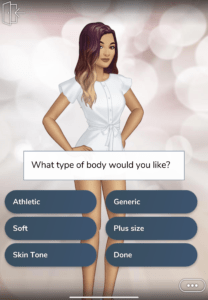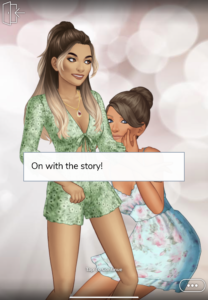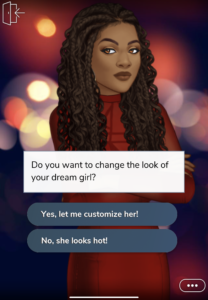As a game known for its interactive storytelling and character customization, Episode has captivated a large audience. Created by Pocket Gems, Episode is available on mobile platforms, offering a diverse range of narratives. However, examining this game through a feminist lens, as discussed in Shira Chess’s “Play like a Feminist,” reveals several critical issues, particularly regarding character customization, representation, and the reinforcement of traditional gender binaries.
One of the first glaring issues I encountered is the way character customization is handled. The body type descriptions for women—athletic, soft, generic, and plus size—are not only limited but also problematic. These terms carry implicit judgments and stereotypes, reducing women’s bodies to simplistic categories that fail to capture the diversity and complexity of real-world body types. Such descriptors can perpetuate harmful beauty standards and body image issues, rather than celebrating diversity.

Body Type Options
The skin color selection is another area where the game falls short. The limited range and odd verbiage used to describe skin tones are concerning. In a world where representation matters, offering a broad spectrum of skin colors and using respectful, accurate terminology is crucial. The current approach in “Royally Wicked” suggests a lack of understanding and sensitivity towards racial diversity and inclusion. Chess emphasizes that games should reflect the diversity of their players and promote social justice, yet “Royally Wicked” seems to lag behind in this respect.
Moreover, the animations often cross into unnecessarily sexual territory. An instance that stands out is the scene where my character and a friend’s character dance together. The overtly sexual nature of their movements felt out of place and objectifying, detracting from the narrative and reducing female characters to sexual objects rather than fully fleshed-out individuals with agency. Given that Episode is rated for ages 12 and up, these sexual themes are particularly concerning and inappropriate for younger audiences.

Oddly Sexual Animation
Customization options for love interests also pose a problem. The phrasing of the customization choice—”Do you want to change the look of your dream girl?” with options “Yes, let me customize her” and “No, she looks hot”—is troubling. This reduces female characters to their physical appearance, implying that their worth is primarily based on their attractiveness. This focus on superficial traits over character depth perpetuates shallow stereotypes and undermines the potential for more meaningful interactions and relationships within the game.

Options to Customize “Dream Girl”
The game’s emphasis on a strict gender binary is another significant flaw. Episode only allows players to choose between male and female characters, completely excluding non-binary and genderqueer identities. This exclusion not only fails to represent the full spectrum of gender but also reinforces outdated notions of gender roles. Including options for non-binary characters and exploring diverse gender identities would greatly enhance the inclusivity and relevance of the game. Chess advocates for games that break free from traditional gender binaries and offer more inclusive experiences.
From a feminist perspective, “Royally Wicked” falls short in several areas. Feminist theories, as outlined by Chess, advocate for the representation of diverse bodies, identities, and experiences, challenging traditional gender norms and stereotypes. The game’s current approach to character customization and representation does not align with these principles. By failing to incorporate a feminist perspective, Episode misses an opportunity to create a more inclusive and empowering experience for all players.
To improve, Episode could start by expanding its customization options. Providing a wider range of body types and skin tones, described with respectful and accurate language, would be a step towards better representation. Additionally, ensuring that animations and interactions respect characters’ agency and avoid unnecessary sexualization is crucial, especially given the game’s young target audience.
Additionally, the mechanics of customization options and gender selection are flawed, reinforcing stereotypes and excluding diverse identities. This directly impacts the dynamics—the way players interact with the game and experience the story. The aesthetics, or the emotional responses players have, are consequently negative for many, as they can feel unrepresented and objectified.
Comparatively, other games in the interactive storytelling genre, such as “Choices: Stories You Play” by Pixelberry Studios, have begun to make strides towards better representation and inclusivity. While not perfect, “Choices” offers more diverse character options and stories that explore a wider range of identities and experiences. “Royally Wicked” and Episode as a whole could benefit from following this example, adopting similar practices to ensure that all players feel seen and valued.
In conclusion, playing “Royally Wicked” as a feminist highlights several critical areas for improvement. By embracing feminist perspectives and prioritizing inclusivity, Episode can transform its stories into truly empowering experiences that celebrate diversity and challenge harmful stereotypes. Such changes would not only align with feminist theories but also create a richer, more engaging platform for storytelling that resonates with a wider audience.
How do you think games like this impact young girls perception of body image?




